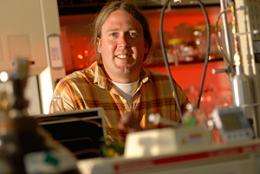Team makes discoveries about major event in history of complex life

(PhysOrg.com) -- A team of scientists led by Montana State University has discovered the "when" of a major event that led to the evolution of complex life on Earth.
Eric Boyd and five other scientists from Montana and Arizona have hypothesized that between 1.5 billion and 2.2 billion years ago, bacteria and single-celled organisms called archaea started producing nitrogen in a useable form. It was the first time that biological processes were involved, and it allowed higher forms of life to flourish.
"That was a huge event in the evolution of life," said Boyd, recipient of a NASA fellowship and assistant research professor in John Peters' lab at MSU.
Nitrogen is abundant in the Earth's atmosphere, but it is not useable by most life until it is "fixed" to other compounds, such as ammonium or nitrate. Nitrogen fixation, or the conversion of nitrogen gas to ammonium, can be accomplished by lightning, but lightning alone could not account for the amount of nitrogen necessary for life on Earth to evolve into the forms seen today.
When microbes started producing fixed nitrogen, the accompanied dramatic increase in fixed nitrogen paved the way for the rise of complex life, the researchers said. Nitrogen is essential to life, important in everything from DNA, to proteins, to neurotransmitters.
The work of Boyd and his fellow scientists was published in two scientific journals this spring. Geobiology ran a full-length paper on their discoveries. The international journal Science summarized the study in its "Editor's highlight" section.
"The big finding is that we showed what kind of environment facilitated the evolution of this process. We put it in relative time," said Boyd, lead author.
Microbes started producing fixed nitrogen in a relatively oxygen-free environment, probably in layers of the ocean where fixed nitrogen was limited, Boyd said. The scientists believe that methanogenic archaea were the first to convert nitrogen in the atmosphere into a useable form.
Then, maybe because of genetic transfer, bacteria developed the ability.
Peters -- director of MSU's Astrobiology Biogeocatalysis Research Center and co-author on the nitrogen paper - said the researchers were the first scientists to estimate when bacteria and archaea started producing fixed nitrogen.
They were able to make their discoveries because of their unique approach that superimposed questions about the origin and evolution of life on the geologic record, he added. Peters, for one, is an expert in biochemistry and enzyme reactions. Boyd specializes in ecology and evolution.
"When you bring these disciplines together, you can see things that other people can't necessarily see," Boyd said, "You can approach problems in ways that other people can't necessarily identify."
Peters said the researchers also used cutting edge technology to examine suites of genes instead of focusing on individual genes. The more genes, the more reliable the results, he said.
Boyd said DNA from billions of years ago isn't available, so the scientists used statistics and computer modeling to understand processes in molecular biology. The scientists used evolutionary theory and built on decades of previous research. They studied biological processes and metabolism in modern microbes to draw conclusions about the ancient microorganisms. The researchers compared the process of producing fixed nitrogen to another key event in life - the emergence of oxygenation for photosynthesis.
Provided by Montana State University
















